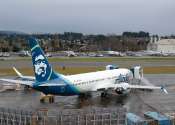Korean Air orders 40 Boeing planes
Korean Air lodged a firm order Monday for 40 Boeing 787 and 777X wide-body aircraft at Britain's Farnborough airshow, handing a boost to the embattled US aviation giant.
Jul 22, 2024
0
1
Business

Korean Air lodged a firm order Monday for 40 Boeing 787 and 777X wide-body aircraft at Britain's Farnborough airshow, handing a boost to the embattled US aviation giant.
Jul 22, 2024
0
1
Business

Boeing shares were hammered Thursday after a top company official predicted another quarter of meager plane deliveries, likely resulting in negative cash for all of 2024.
May 23, 2024
0
1
Hi Tech & Innovation

If you could fly from New York to London in half the time, would you? With a renewed interest and investment in commercial supersonic flight, that's what some companies hope to achieve.
Mar 22, 2024
0
9
Business

Twelve passengers were hospitalized Monday after a technical problem on a LATAM flight from Sydney to Auckland caused the Boeing-made plane to dip violently, the airline and first responders told AFP.
Mar 11, 2024
0
6
Business

Bolts that helped secure a panel to the frame of a Boeing 737 Max 9 were missing before the panel blew off the Alaska Airlines plane last month, according to accident investigators.
Feb 6, 2024
0
19
Business

A top Boeing executive has apologized for the problems highlighted by the mid-flight blowout of a door plug on an Alaska Airlines flight, as two airlines began returning the troubled 737 MAX 9 planes to service.
Jan 28, 2024
0
1
Other

Boeing 737 Max 9 jetliners are carrying passengers in the United States again for the first time since they were grounded after a panel blew out of the side of one of the planes.
Jan 26, 2024
0
5
Business

US regulators approved a detailed inspection framework that would allow the return to service of Boeing 737 MAX planes grounded after an emergency landing earlier this month, officials said Wednesday.
Jan 25, 2024
0
3
Business

A Boeing 757 jet operated by Delta Air Lines lost a nose wheel while preparing for takeoff from Atlanta.
Jan 24, 2024
0
19
Business

Many travelers are opting to take a plane rather than train between London and Paris despite climate concerns and the Eurostar rail service connecting the two capitals in just over two hours.
Jan 24, 2024
1
33
A planet (from Greek πλανήτης, from the verb πλανώμαι planōmai I wander), is a celestial body orbiting a star or stellar remnant that is massive enough to be rounded by its own gravity, is not massive enough to cause thermonuclear fusion, and has cleared its neighbouring region of planetesimals.[a]
The term planet is ancient, with ties to history, science, myth, and religion. The planets were originally seen by many early cultures as divine, or as emissaries of the gods. Even today, many people believe in astrology, which holds that the movement of the planets affects people's lives, although such a causation is rejected by the scientific community. As scientific knowledge advanced, human perception of the planets changed, incorporating a number of disparate objects. Even now there is no uncontested definition of what a planet is. In 2006, the IAU officially adopted a resolution defining planets within the Solar System. This definition has been both praised and criticized, and remains disputed by some scientists.
The planets were thought by Ptolemy to orbit the Earth in deferent and epicycle motions. Though the idea that the planets orbited the Sun had been suggested many times, it was not until the 17th century that this view was supported by evidence from the first telescopic astronomical observations, performed by Galileo Galilei. By careful analysis of the observation data, Johannes Kepler found the planets' orbits to be not circular, but elliptical. As observational tools improved, astronomers saw that, like Earth, the planets rotated around tilted axes, and some share such features as ice-caps and seasons. Since the dawn of the Space Age, close observation by probes has found that Earth and the other planets share characteristics such as volcanism, hurricanes, tectonics, and even hydrology. Since 1992, through the discovery of hundreds of extrasolar planets (planets around other stars), scientists are beginning to understand that planets throughout the Milky Way Galaxy share characteristics in common with our own.
Planets are generally divided into two main types: large, low-density gas giants, and smaller, rocky terrestrials. Under IAU definitions, there are eight planets in the Solar System. In order from the Sun, they are the four terrestrials, Mercury, Venus, Earth, and Mars, then the four gas giants, Jupiter, Saturn, Uranus, and Neptune. The Solar System also contains at least five dwarf planets: Ceres, Pluto (originally classified as the Solar System's ninth planet), Makemake, Haumea and Eris. With the exception of Mercury, Venus, Ceres and Makemake, all of these are orbited by one or more natural satellites.
As of June 2009, there are 353 known extrasolar planets, ranging from the size of gas giants to that of terrestrial planets.
This text uses material from Wikipedia, licensed under CC BY-SA